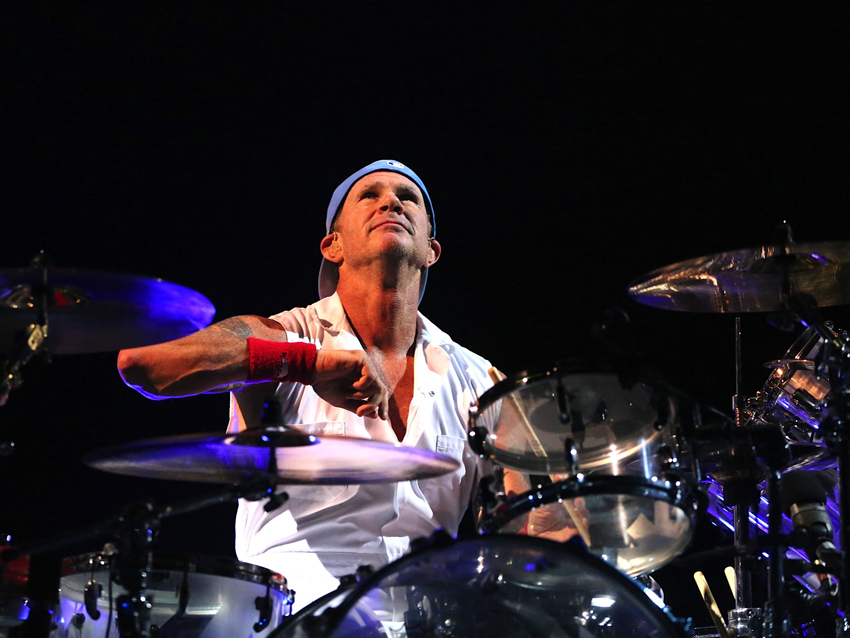
Chad Smith talks The process, Chili Peppers and music in schools
Chad Smith's recent drum-off with doppelganger Will Ferrell was a TV ratings and internet-trending bonanza. So what is the Red Hot Chili Peppers drumming powerhouse doing for an encore? No, he's not appearing on Dancing With The Stars; instead, he's hooked up with bassist/producer and "collision music" purveyor Bill Laswell, along with New Orleans-bred pianist and bandleader Jon Batiste, for an adventurous, jam-based, genre-defying collaboration called The Process.
“I like to take risks and try different things," Smith tells MusicRadar. "Sometimes they work, sometimes they don’t. Jon, Bill and I never had played together before, so if it didn’t work at least it was a fun experiment. The fact that it did means that it was worth taking a chance."
The Process, which also features guest spots by Wu-Tang Clan's Killah Priest and TV On The Radio's Tunde Adebimpe, is available at iTunes and on Amazon. In the following interview, Smith discusses how the project came together, his ongoing work to bring music to schools, the status of the next Chili Peppers record and whether he's going to attempt to wrestle the Golden Cowbell from Ferrell's hands next year.
Walk me through how you hooked up with Bill and Jon.
“When I was living in New York, we’d have breaks on our tour and so I’d be looking for things to do. My friend Jay Bulger, who did the Ginger Baker documentary [Beware Of Mr. Baker], lives in New York, and one day he told me, ‘Chad, you’ve gotta check out this kid Jon Batiste. He’s incredible. He’s the future of jazz, and he’s playing next week in Harlem at a church.’ I said, ‘That sounds great. I’m going.’
“I went and saw Jon and his band, and they were great. Jon and I talked, and I loved how cool and positive he was. I got up and jammed with him and the band, and we really hit it off. That was the beginning of it. I talked to Jay again, and I told him, ‘Man, on one of my breaks, I’d love to make some music with Jon.’ I wanted to get a cool bass player and go do some stuff at Electric Lady Studios. I’d never done anything there, and that’s always been a dream of mine.
“Jay said, ‘What about Bill Laswell? He’s a great bass player.’ I thought that sounded tremendous. Bill is a friend of Jay’s, so Jay called him up and ran it by him, and Bill was totally into it. As it turned out, Bill has a studio in West Orange, New Jersey, so he went there and got into it.”
So you didn’t get to record at Electric Lady?
“No, we never made it there – we did everything at Bill’s place. I’ve still gotta get to Electric Lady. I’ve played in Abbey Road, I’ve played at a lot of the famous LA studios, but Jimi’s place still eludes me. Hendrix is probably my favorite musician, so I wanna conjure up some music at the studio he built. One day I will.”
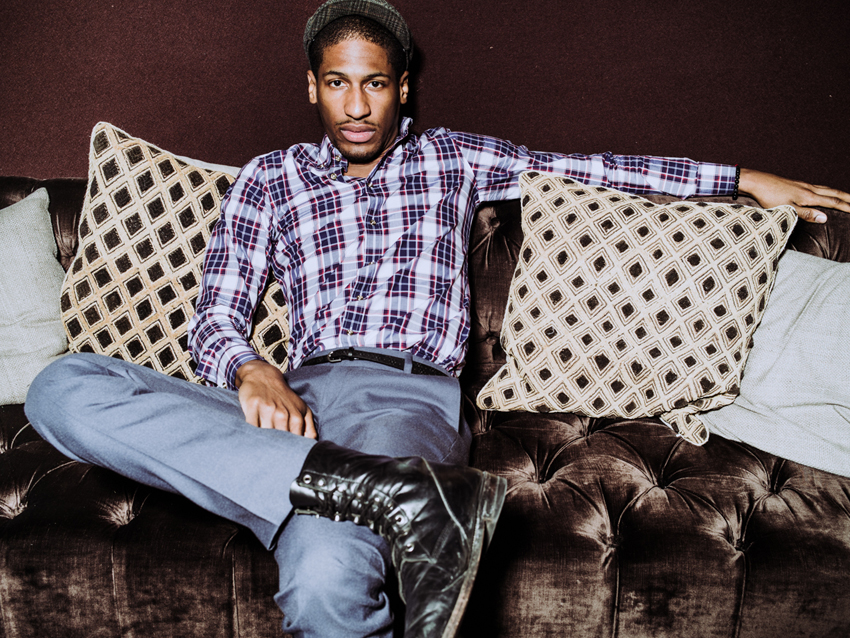
On Jon Batiste (pictured)
There was a film idea floating around, too, right? Didn’t Jay want you guys to do something for one of his projects?
“Yeah, Jay was working on a film, and he thought it would be great for us to do the music. He’d give us these little ideas like, ‘Think post-apocalyptic Detroit. The guy’s walking down the street, and he’s listening to Electric Miles…’ Or he’d say, ‘Think an African/Meters-type thing…’ Those were our jumping-off points that we used to improvise.
“What was really different right away was when Bill said, ‘Chad, you’re known for doing your funk-rock thing, and Jon, you’re kind of this New Orleans pianist. Let’s get you both out of your comfort zones. Chad, why don’t you play more tribal-y stuff? And Jon, let’s get you on more electric instruments.’ And that was great. Jon played some piano, but he also played Wurlitzer and Rhodes and Clavinet and B3 – all electric instruments.
"Everybody took some risks and did some experimentation, but I really have to hand it to Bill. He put the whole thing together and edited the jams into songs, and he brought in people that he knew – sax players, trumpet players, guitarists, Killah Priest from Wu-Tang Clan, Tunde from TV on the Radio… Bill tied it all up.”
How would you say The Process differs from your other side project, the Bombastic Meatbats? It feels like it's a more jam-oriented thing.
“I would say so. A lot of The Process is instrumental, as is the Meatbats. With the Meatbats, we work out the songs prior to recording. The songs are more typical – verses, choruses and solos. With Bill and Jon, it’s really us getting in a room and saying, ‘Go! Somebody pick a key, I’ll start a rhythm, and we see where we land.'”
There’s no real lead instrument. It feels as if you’re all leading, yet it doesn’t turn into the Wild West.
“That’s true. If you listen to the drumming, my patterns change when the music changes. I’m not soloing in any way, but I’m playing distinct patterns – a lot of them are tom-oriented. Nobody’s really trying to grab the spotlight; it’s a real band kind of mentality. But I think it’s cool that we have trumpet solos and sax solos, because that takes it somewhere else and makes it more interesting. In general, though, everybody’s just being supportive of one another and trying to come up with cool grooves.”
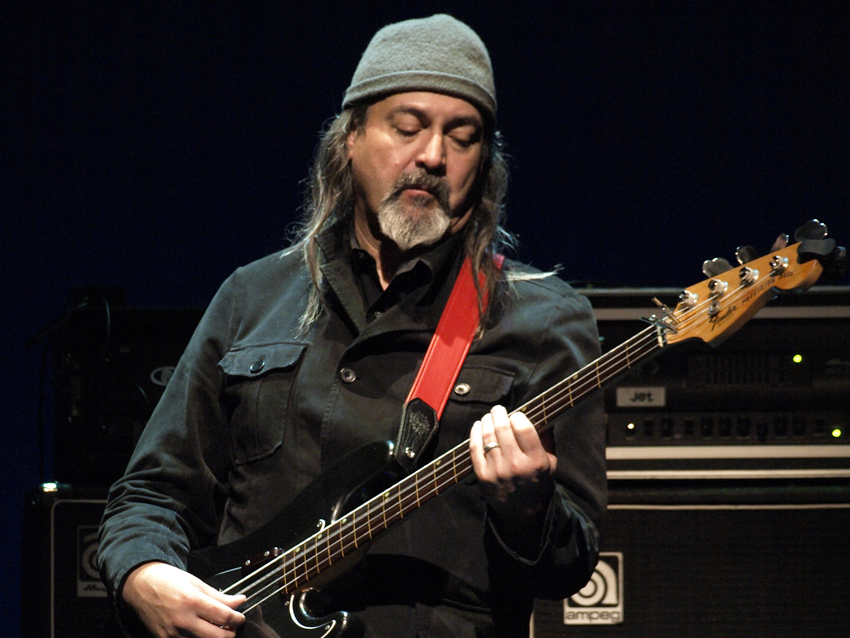
On Bill Laswell (pictured)
You said that you tried not to play grooves you’ve played before. Seeing as you’ve recorded hundreds of songs already, that must have been tough.
[Laughs] “Yeah, it’s easy to fall into that ‘I’ve-got-my-one-beat-and-it-works’ kind of thing. That was the challenge that Bill put to us: ‘We know you guys can do this, but let’s make it uncomfortable.’ For me, that was what I had to do. I’ve played beats on toms before, but I’ve never done the Ginger Baker-tribal-African thing. Not that I really did that – it was sort of my take on it. Bill was like, ‘Yeah, that’s cool. It sounds like avant-tribal-funk.’ [Laughs] I said, ‘OK, I’ll go with that.’
“Some of the beats are things that I’ve used to warm up before Chili Peppers shows. There’s a track called Time Falls where it sounds like a double-bass thing, but it’s not. I was just screwing around with it, and Bill said, ‘That’s cool. I’ve got something for that.’ It was very spontaneous in that way.”
Is Jon a prog fan at all? In songs like Timeline and Black Arc, his keyboard sounds are reminiscent of Keith Emerson.
“You know, I’m not sure. He’s a well-rounded musician, and I’m sure that he knows a lot of different kinds of music. His roots are New Orleans. The Batiste family is like the Nevilles – they’re ingrained in that New Orleans culture of music. His dad is a great drummer and plays in the Meters. So while Jon’s roots are New Orleans – you know, not prog – I think that when he was put in this situation he was forced to think and play differently.”
How was it working with Bill as a bass player? A lot of people think of him only as a producer.
“He was incredible. He’s so musical – his vocabulary is so varied and deep. He had lots of great ideas. One of the things he said was, ‘There’s a lot of space to this’ – and he would just lay out. I thought that was really brave of him. Lots of guys would just overplay and load things up, but Bill knows when to not play. He’s very quiet and funny and cerebral, which was a good contrast to me and Jay – we’re just bouncing off the walls most of the time.”
I saw a picture of you the other day on Facebook. You were appearing at a Turnaround Arts event at a school. Was that part of your work with Little Kids Rock?
“Yeah, that was a school in Greenfield, California. Little Kids Rock is one of the great sponsors that has partnered with me and my charitable endeavors. All of the companies I work with – Pearl, Sabian, NAMM, Remo and Vater – donated instruments to the school. Hal Leonard, who I also work with, donated music books. Everybody’s been terrific. Turnaround Arts is the program that Michelle Obama heads. This year I’ve been chosen to be an ambassador, along with some other musicians, and I get to pick a school to sort of adopt. Being a Californian, I thought it would be cool to do something in my home state."
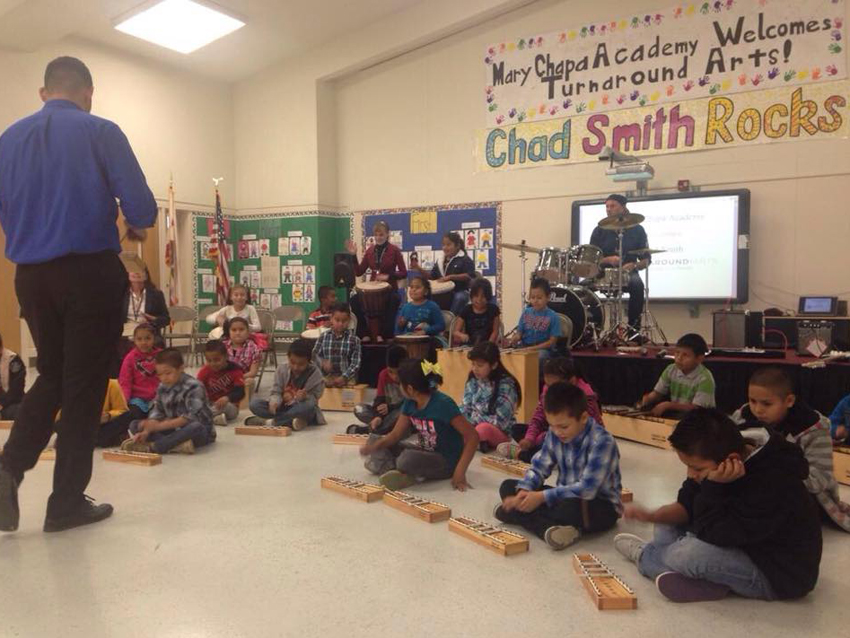
The Turnaround Arts Program
“This school, Mary Chapa, was one of the worst performing schools in the whole state, but they instituted Turnaround Arts, which puts the focus on the arts, and now it’s doing great. Obviously, one of the first things that they cut in schools because of money is the arts – we know that – but it’s been shown that an emphasis on arts brings these kids’ grades levels up. The program gives kids hope, and it helps improve not only their grades but also their attendance and graduation rates.
“I went to Washington last year, and I let ‘em know: This thing is working. When Mrs. Obama started this, it was a two-year program with just eight schools, and every one of them has done incredibly well. So more money was put into it, and now it’s up to 35 schools. I have a feeling that in another two years there’ll be an even bigger grant, because it’s working and it’s positive and it’s great.
“You know, it’s an easy thing for me to do, but to see the look on these kids’ faces and to hear their stories – it’s amazing. I’m happy to go up there and do my thing, get ‘em all pumped up. And it’s important: If I didn’t have music in my public schools, I might not be doing what I’m doing today. That’s how I learned how to play music. I started band classes in fourth grade and went all through middle school and high school. I probably wouldn’t have graduated if it weren’t for the music classes – that’s what kept me coming back.”
So what’s the status with the next Chili Peppers record? Where are you guys at with it?
“We’re writing our songs, and we’re really close to getting in to start recording. I think we’ll probably go up to December, do a little pre-production on ‘em, and then we’ll take a little Christmas break. I hope to be recording after the first of the year.
“We’ve probably worked up close to 30 songs. I don’t know if we’ll record all of them. I think last time we overdid it a little, so we’re trying to really hone in on the ones that’ll rise to the top. Maybe we’ll do a bit more pre-production so we can make sure the songs are the best they can be. Traditionally, we’ve always recorded 25 or 30 songs, so we’ll see. It won’t be 50 like last time. [Laughs] We always say, ‘Oh, we’re doing to do a Beatles thing and just do 10 or 11 songs,’ and then it always turns into an epic fucking thing. This time, I thing we’ll focus on the quality and not the quantity.”
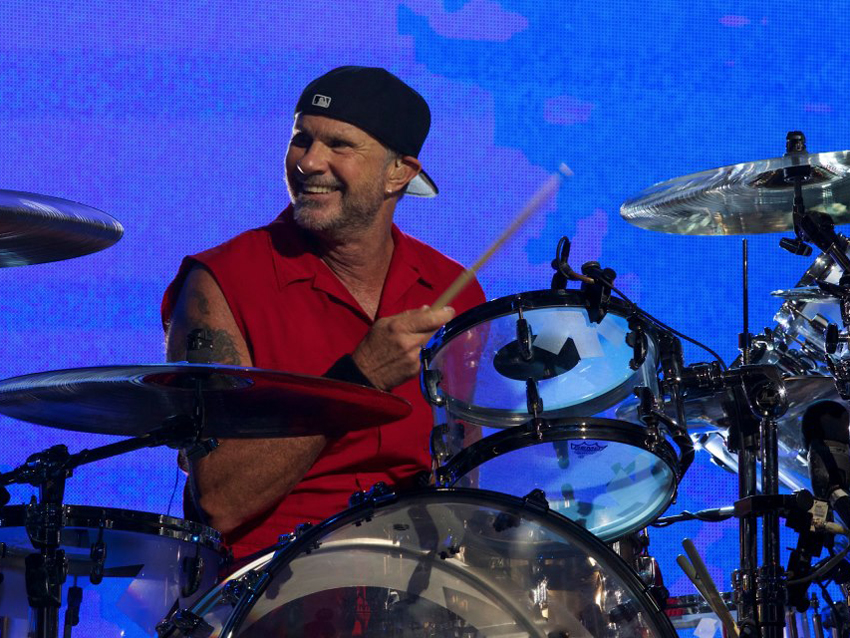
More Drum-Offs with Will Ferrell?
You’ve also got this thing going on… what’s it called? In Conversation?
“Oh, yeah, it’s amazing! Incredible.” [Laughs]
It is, actually, and it’s been a real thrill for us at MusicRadar to be involved in it with you. Let me ask you, what have you learned by being on the other side of the interview process?
“It’s been really great. Sitting down with old pals like Alex [Lifeson] and Stone [Gossard], those were so easy and breezy. It’s like hanging out and talking about the experiences that we’ve all gone through. But then sitting down with people like Tina [Weymouth] and Chris [Frantz], whom I didn’t know before, that was great in a different way, and it was cool to see how funny and smart they are. I came away from that thinking, ‘It makes sense why they’re such great musicians, because they’re great people.’ So I got that out of it, for sure. Ginger Baker, now, that was a different experience.”
Oh, my word yes. He didn’t hit you, though.
[Laughs] “No, he didn’t, but I was ready for it. I went into it thinking, ‘I don’t know... This is gonna be rough.’ And it was. But I’m glad that I did it because he’s a really important drummer and is so hugely influential. It was nice to see that he went to – and I guess perform at – Jack Bruce’s funeral. He’s a bit of a curmudgeon, but I think that, at his core, he’s a good person and has some empathy. It’s been a little nerve-racking at times, doing this thing. I’m not an interviewer – I’m a musician – but I do like the idea of two musicians sitting down and talking shop. I’m happy to do it. I’d like to do more whenever it’s possible.”
You do a great job with it. And you were terrific with Carlos Santana, as well.
“Thanks. That was a fun one. I’d never met Carlos before, but he was up for it and off we went. I didn’t know he was a fan of our band, so that was nice to hear. We just talked musician to musician. I think that’s the thing with this: They know they can let their guard down with me and that I understand what they’re talking about.”
Lastly, what’s going on with the next drum challenge between you and Will Ferrell? Is Lars Ulrich going to do it?
“I think that was kind of a joke. Will and I thought it was funny because Lars looks nothing like us. Lars got the joke, too – he knows he doesn’t look like us. It wasn’t meant to be a serious thing, but people went with it. But Will and I are hoping we can cook something else up for next year, something more epic. So just stay tuned.”
Joe is a freelance journalist who has, over the past few decades, interviewed hundreds of guitarists for Guitar World, Guitar Player, MusicRadar and Classic Rock. He is also a former editor of Guitar World, contributing writer for Guitar Aficionado and VP of A&R for Island Records. He’s an enthusiastic guitarist, but he’s nowhere near the likes of the people he interviews. Surprisingly, his skills are more suited to the drums. If you need a drummer for your Beatles tribute band, look him up.
